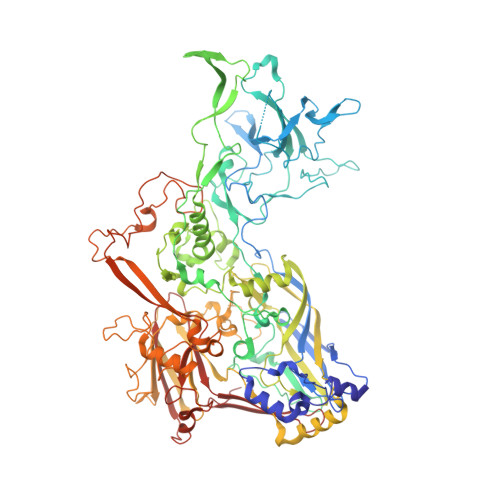Structure-based identification of a major neutralizing site in an adenovirus hexon
Pichla-Gollon, S.L., Drinker, M., Zhou, X., Xue, F., Rux, J.J., Gao, G.-P., Wilson, J.M., Ertl, H.C.J., Burnett, R.M., Bergelson, J.M.(2007) J Virol 81: 1680-1689
- PubMed: 17108028
- DOI: https://doi.org/10.1128/JVI.02023-06
- Primary Citation of Related Structures:
2OBE - PubMed Abstract:
Virus-specific neutralizing antibodies present an obstacle to the effective use of adenovirus vectors for gene therapy and vaccination. The specific sites recognized by neutralizing antibodies have not been identified for any adenovirus, but they have been proposed to reside within the hexon, in small regions of the molecule that are exposed on the capsid surface and possess sequences that vary among serotypes. We have mapped the epitopes recognized by a panel of seven hexon-specific monoclonal antibodies that neutralize the chimpanzee adenovirus 68 (AdC68). Surface plasmon resonance experiments revealed that the antibodies compete for a single hexon binding site, and experiments with synthetic peptides indicated that this site resides within just one small surface loop. Mutations within this loop (but not in other surface loops) permitted virus to escape neutralization by all seven monoclonal antibodies and to resist neutralization by polyclonal antisera obtained from animals immunized against AdC68. These results indicate that a single small surface loop defines a major neutralization site for AdC68 hexon.
Organizational Affiliation:
Abramson Research Center, Room 1205G, Immunologic and Infectious Disease, The Children's Hospital of Philadelphia, 3601 Civic Center Blvd., Pennsylvania, PA 19104, USA. pichla@email.chop.edu
















